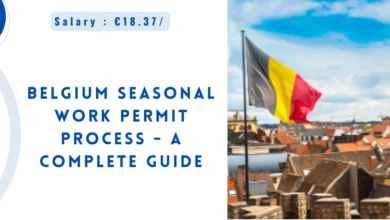Study and Work Permit Rules in Canada 2025
Major modifications to Canada’s immigration laws have been implemented recently; these modifications primarily impact individuals who are applying for work and study visas. These modifications are indispensable for pupils and employees who intend to relocate to Canada. In this section, we provide a comprehensive overview of the new regulations, their implications, and the factors that prospective candidates should consider.
1. Switching Study Permits and Colleges:
Previous Policy:
In the past, foreign students who were studying in Canada were permitted to transfer to another university as long as it was a designated learning institution (DLI) and they did not need to renew their study permit.
New Guidelines:
To transfer to colleges or universities, students will be required to apply for a new study permit by the revised regulations. This is particularly crucial for students attending private colleges, as the government is interested in closely monitoring and regulating student transitions.
Implications:
- Additional Paperwork: Students are required to execute a process that may necessitate additional documentation and waiting periods in order to file for a new permit.
- Financial implications: Switching institutions may incur additional expenses, including tuition rate fluctuations and application fees.
- Planning Is Essential: Students should meticulously strategize their academic trajectory, considering the implications of changing institutions on their study permits.
2. There Is No Certain Route to Permanent Residency (PR):
Previous Policy:
Numerous students believed that studying in Canada would result in perpetual residency. Moving from a study permit to a work permit and then to permanent residence was a relatively straightforward procedure for qualified individuals, although it was not certain.
New Guidelines:
Immigration Minister Mark Miller has recently stated that studying in Canada does not guarantee permanent status, as the Canadian government has made it plain. The primary objective of a study permit is to provide education; however, not all pupils will qualify for permanent residence (PR).
Implications:
- Increased Uncertainty: Students are unable to assume that their studies in Canada will lead to permanent residence.
- Alternative Plans: It is imperative that students conduct research and understand the competitiveness and prerequisites of alternative PR pathways, including express entry and provincial nominee programs (PNPs).
3. Permits to Work After Graduation:
Previous Policy:
Recipients of a Post-Graduation Work Permit (PGWP) were able to acquire work experience within Canada after graduating from Canadian universities. This experience is occasionally a necessary prerequisite for applying for permanent residence (PR).
New Guidelines:
The new legislation imposes limitations and restrictions on PGWPs. The terms and duration of work permits may vary, and not all graduates will be granted one.
Implications:
- Limited Work Experience Opportunities: Graduates may have fewer opportunities to acquire the Canadian work experience necessary for PR.
- Competitive Employment Market: The employment market may become more competitive for graduates as fewer work permits are issued.
- Early Career Planning is Essential: It is recommended that students begin contemplating their future careers as soon as feasible. They may want to consider applying for apprenticeships or co-ops, which frequently lead to employment offers.
4. Problems with Visitor Visas and Deportations:
Previous Policy:
The number of individuals deported from entrance ports decreased, and visitor permits were typically issued to those who met the minimum admission requirements.
New Guidelines:
Upon their arrival in Canada, travelers with visiting visas have been denied entry at the airport in numerous cases. This encompasses visitors who, similar to asylum seekers, may have desired to extend their stay or modify their status.
Implications:
- Enhanced Border Control: Canadian border services are conducting a thorough examination of the intentions and documentation of visitors.
- Deportation Risk: Individuals who are suspected of preparing for an extended stay or do not meet the entry requirements may be deported immediately.
- Preparation and Documentation: It is imperative that travelers provide clear and convincing documentation to substantiate their stated reasons for visiting Canada.
5. Claims for Asylum and Refugees:
Previous Policy:
Canada’s asylum and refugee claims were managed by a relatively robust system, which enabled petitioners to remain in the country and potentially secure employment during the extended processing times.
New Guidelines:
An investigation is underway on claims that are not eligible for refuge, and the processing times for asylum petitions have been accelerated. The government is emphasizing that individuals who do not satisfy other visa requirements should not contemplate asylum as an alternative to immigration.
Implications:
- Faster conclusions: Asylum seekers will spend less time in Canada during the claim procedure if they receive conclusions more swiftly.
- Enhanced Deportations: Individuals who are denied a claim or are discovered to have applied without a legitimate reason are at a higher risk of being deported.
- Legal Advice: In order to ensure that their claims are both well-prepared and legitimate, prospective asylum applicants should consult with a lawyer.
What Future Employees and Students Should Do
- Conduct Comprehensive Research: Maintain awareness of the most recent immigration laws and regulations from official Canadian sources.
- Seek the guidance of a professional: Consult with immigration advisors or attorneys to determine the potential impact of these modifications on your specific situation.
- Develop a financial and logistical strategy: Be prepared for increased expenses and paperwork, and meticulously plan your educational and professional paths.
- Analyze Alternative Routes: Analyze the numerous alternatives for remaining in Canada, such as provincial nominee programs, express entry, and work permits.
- Maintain Compliance: Ensure that all of your actions, including the acquisition of permits and entry into Canada, are in accordance with the most recent immigration regulations and guidelines.
Check Also: Canada Study Visa Update – Visit Here
Benefits of Study and Work Permit Rules in Canada:
- Work During Studying On-Campus and Off-Campus Work: International students are generally permitted to work up to 20 hours per week during academic sessions and full-time during scheduled breaks. This assists students in managing their living expenses while acquiring Canadian work experience.
- Postgraduate Work Permit (PGWP) Extended Work Opportunities: Graduates from eligible Canadian institutions are eligible to apply for a PGWP, which enables them to work in Canada for a period of up to three years following the completion of their studies. This enables students to acquire valuable work experience in their respective fields.
- Easier Transition: The transition to permanent residency may be facilitated for international students who acquire work experience through a PGWP, as they may be eligible for a variety of immigration programs, including the Canadian Experience Class.
- Cultural Exchange and Integration: Diverse Environment: International students are able to engage with a multicultural society by studying and working in Canada, which facilitates cultural exchange and integration into Canadian life.
- Education of High Quality: World-Class Institutions: Canada is home to a plethora of top-ranked universities and colleges that offer a high-quality education that is acknowledged on a global scale. This can have a positive impact on job prospects in Canada and abroad.
- Skill Development Work Experience: Students can enhance their employability by applying their academic knowledge in practical settings, thereby establishing essential skills and professional connections.
- Support Services International Student Support: Numerous institutions provide support services that are specifically designed for international students. These services include career counseling, seminars, and networking events, which are designed to assist students in navigating their academic and professional endeavors.
- Program Choice’s Flexibility: Program Variety: Canada provides international students with a diverse selection of programs that enable them to select courses that are consistent with their career objectives and to gain experience in related fields.
- Spousal Work Permits: Open work permits may be granted to the spouses or common-law partners of international students, enabling them to work in Canada while the student completes their studies.
- Bilingual Environment: The global labor market is rife with opportunities to enhance language skills, particularly in English and French, through study and employment in Canada.
Conclusion:
The recent changes to Canada’s work permit and study visa laws have underscored the significance of being well-prepared and understanding the immigration process. Nevertheless, these modifications may present additional challenges; however, they also facilitate a more structured and informed approach to studying and working in Canada.
In order to effectively navigate these new regulations, it is imperative for individuals who aspire to relocate to Canada to be proactive and knowledgeable.
Stay informed about the most recent information on visa application processes, work permits, pathways to permanent residency, and visa-sponsored employment by following us on Newsnowgh.com.
For More Info:
Email Your CV, and We’ll Find the Best Pathway For you: info@newsnow.pk
Frequently Asked Questions:
Can you work for 40 hours with a study permit in Canada?
Students eligible to work under paragraph R186(v) can do the following: work up to 20 hours per week during academic sessions once they have commenced their program of study. work full-time during regularly scheduled breaks between academic sessions regardless of their course.
Can I work 24 hours as a student in Canada?
International students in Toronto will be adversely affected by a new federal rule that says they can only work 24 hours a week off-campus in Canada,
What are the new rules for work permits in Canada in 2025?
Canada has updated rules for the Post-Graduation Work Permit (PGWP), effective from November 1, 2025. These changes include stricter guidelines for college graduates, focusing on specific fields of study. Popular programs like business and hospitality are excluded, impacting many international students.




